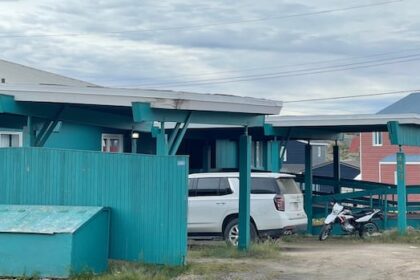New BrunswickNew Brunswick’s ombud says Restigouche Hospital Centre staff have been restraining and secluding psychiatric patients improperly.Watchdog says Restigouche Hospital Centre staff improperly restrained, secluded patients in their careSavannah Awde · CBC News · Posted: Sep 23, 2025 5:21 PM EDT | Last Updated: 2 hours agoOmbud Marie-France Pelletier began an investigation after receiving complaints from psychiatric patients about being restrained or kept in a seclusion room for extended periods. (Chad Ingraham/CBC)New Brunswick’s ombud found psychiatric patients were forced to urinate and defecate on the floor and faced sexual and physical assault while improperly restrained by staff. Ombud Marie-France Pelletier said stories from patients at the Restigouche Hospital Centre in Campbellton, shared with her office during an investigation into restraints and seclusion rooms, are very difficult to read.Seclusion, or isolating a psychiatric patient in a separate room, and restraints, which limit a person’s mobility, are meant to be used minimally with a patient who poses a danger — and only after staff have attempted to de-escalate the situation, the ombud said in a report released Tuesday.Staff are also supposed to perform regular checks on a patient put under restraint or in seclusion.But Pelletier found this isn’t always happening.WATCH | Reviewing patient experiences was ‘saddening and troubling,’ ombud says: Restigouche staff improperly restrained and secluded psychiatric patients, ombud saysA report by the New Brunswick ombud details neglect and assault on psychiatric patients by staff at the Restigouche Hospital Centre in Campbellton.In complaints to her office, patients under seclusion or restraint said their most basic needs — such as using the bathroom, showering, and eating meals upright — were not met.Other patients reported suffering physical harm at the hands of staff during these interventions.In one case, a patient was sexually assaulted by staff while restrained in a seclusion room.Pelletier said that incident was captured and verified through video monitoring at the centre and referred to the RCMP, but no charges were laid as a result. Vitalité Health Network did not respond to questions on Tuesday about whether the staff in question were terminated or faced other consequences.The Restigouche Hospital Centre is has been open for just 10 years, but in that time has been the subject of several reports about patient mistreatment and legal action.No way to call for helpWhen patients were placed in seclusion rooms and restrained, Pelletier said there was no method for them to call staff for help.Rooms are video monitored, she said, so patients were instructed to try and wave toward the camera, but that didn’t always work.The cover page of the report shows someone in a seclusion room holding up a piece of paper with “HELP!” written on it. Pelletier said this is a real image of a psychiatric patient in New Brunswick. Others tried to get assistance by writing “Help Me” with pieces of styrofoam cups or by pouring water on their mattresses, she said.”Sometimes these patients were calling for help, but the assistance never came,” Peletier told a legislative committee on Tuesday.Some patients used paper to communicate that they needed staff to help them. Others would pour water onto their mattresses to spell ‘Help Me,’ the ombud said. (Submitted by Ombud New Brunswick )Patients were spending anywhere from two to 285 consecutive hours in a seclusion room, and three to 58 consecutive hours physically restrained to a bed, she said.Patients were left soiled, or forced to defecate and urinate on the floor when calls for help were not heard. Requests for a shower were also not always granted.Patients also sometimes struggled to eat their meals in the positions they were restrained in. Restraints must be ordered by a medical professional, Pelletier said, and certain details, such as the duration of use, must be included in the order.But she found restraint orders were instead instructing staff to use restraints on an as-needed basis — in contravention of regional health authority policies. In a statement Tuesday responding to the report, Vitalité Health Network did not apologize. “The situations described are unacceptable and go against the care philosophy we uphold,” said Sébastien Lagacé, associate vice-president of mental health and addiction.”To those who have experienced these situations, we wish to express our full consideration and our firm commitment to bringing about lasting change.”Restraint use not monitoredExactly how many patients are having this experience remains unknown, Pelletier said.That’s because the investigation found neither Vitalité nor Horizon Health Network, the two regional health authorities, has a monitoring system to track the use of restraints in any of their facilities. Since the investigation, Pelletier said, the Restigouche Hospital Centre has introduced a “live dashboard” that staff must fill out to show when physical restraints are applied. While complaints from the Restigouche Hospital Centre initiated the report, the ombud also reviewed practices in psychiatric units across New Brunswick.Based on the findings, she issued 21 recommendations aimed at the regional health authorities, the Department of Health and Department of Social Development.The Restigouche Hospital Centre in northern New Brunswick opened just 10 years ago. (Serge Bouchard/Radio-Canada)Pelletier is calling on the province to update the Mental Health Act to reinforce that restrictive measures should be used minimally in psychiatric settings and to require better documentation and reporting when restraint is used. She said the regional authorities should introduce policies aligned with that update, to give clear instruction on the use and removal of restraints, as well as new policies on use of force and the use of spit hoods.Regional health authorities should also adopt a requirement in code white policies, used when a patient is aggressive, to require an incident report be filed every time the code is called. Pelletier said patients were spending anywhere from two to 285 consecutive hours in a seclusion room, and three to 58 consecutive hours physically restrained to their beds. (Chad Ingraham/CBC)Lagacé said Vitalité accepts the report’s recommendations.Margaret Melanson, president and CEO of Horizon Health, said the network will also act on the report.”We will be undertaking a comprehensive review of the recommendations to develop a detailed action plan that will guide necessary improvements to our programs and processes,” she said by email.Rob McKee, the minister responsible for addictions and mental health services, said the government also fully accepts the recommendations.”We want to thank the ombud for her important work and especially thank the patients and families who bravely shared their stories to help improve the system,” he said in a statement.”Important changes are already underway — such as stronger training, updated protocols, and closer monitoring of restraint use.”ABOUT THE AUTHORSavannah Awde is a reporter with CBC New Brunswick. You can contact her with story ideas at savannah.awde@cbc.ca.
Psychiatric patients assaulted while restrained, left soiled in seclusion, N.B. ombud says











